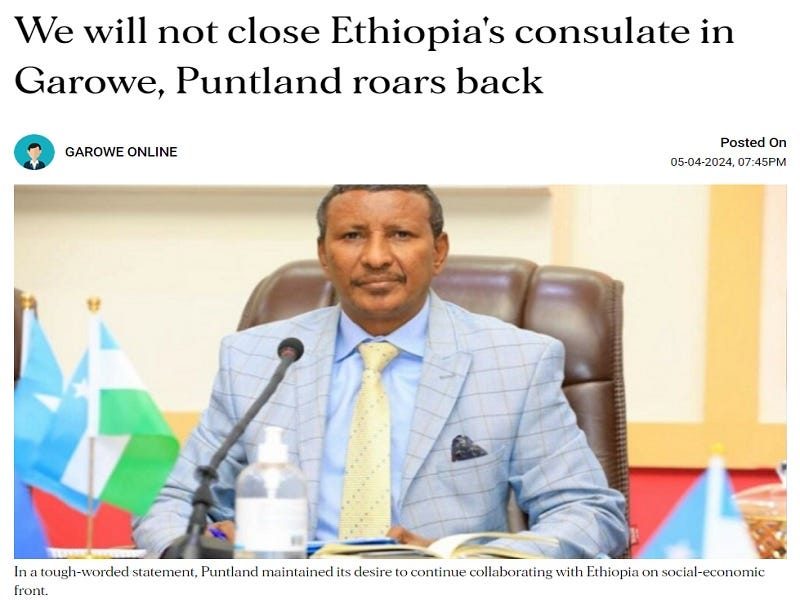The Federal Government of Somalia’s military toothlessness is responsible for its impotence, but instead of focusing on rectifying the former ahead of the foreseeable terrorist upsurge that’ll follow the withdrawal of foreign forces, Mogadishu would rather saber-rattle against Somaliland, Ethiopia, and Puntland as a distraction.
The Federal Government of Somalia (FGS) demanded that the autonomous State of Puntland close the Ethiopian consulate in the regional capital of Garowe as part of Mogadishu’s latest diplomatic move to protest January’s Memorandum of Understanding (MoU) between Ethiopia and Somaliland. The FGS also expelled the Ethiopian ambassador and his diplomatic staff alongside demanding the closure of that country’s consulate in Somaliland’s capital of Hargeisa.
Both Puntland and Somaliland refused to comply with this demand since the first withdrew recognition of the FGS last week to protest controversial constitutional changes while the second redeclared its independence in 1991 and has been de facto independent since then. The FGS is powerless to impose its declared writ over those two regions that it still claims as its own, with this latest development exposing just how impotent of a paper tiger it’s become despite how loudly it’s roared against both.
For as angrily as the FGS protested January’s MoU that’ll give Ethiopia military-commercial port access in Somaliland in exchange for stakes in at least one national company and recognition of its independence, it ultimately didn’t do anything tangible and only postured by dispatching its leader to Eritrea and Egypt. Neither of Ethiopia’s traditional rivals were interested in joining his planned Hybrid War coalition for reconquering Somaliland, and even his country’s Turkish military ally doesn’t want to get involved.
About that country, it still has close ties with Ethiopia despite signing a maritime security deal with Somalia in late February that’ll give it a percentage of that country’s offshore resources in exchange for patrolling the coasts that Mogadishu claims as its own. Ankara officially regards both Somaliland and Puntland as part of the FGS, yet it hasn’t signaled that it’ll dispatch warships to their waters, nor has Mogadishu officially requested this either.
The impression that objective observers get from monitoring these developments is that the FGS barks loudly but doesn’t bite, not because it doesn’t want to do the latter, but simply because it’s toothless. The country’s security is dependent on those foreign forces that assist it with keeping Al-Shabaab (AS) at bay, but their withdrawal by the end of the year will likely lead to an explosion in terrorism. Instead of preparing for that eventuality, the FGS would rather indulge in distractions and saber-rattling.
The calculation appears to be that spewing ultra-nationalist rhetoric can bring AS onto its side as an “ally of convenience” for waging Hybrid War against Somaliland, Ethiopia, and soon possibly Puntland as well. If the terrorists can’t be co-opted through these means, then the FGS risks falling just like the erstwhile Western-backed Islamic Republic of Afghanistan did in summer 2021. Another “emirate” might rise in its place and/or a “Scramble for Somalia” could begin for bases and maritime resource rights.
The FGS’ military toothlessness is responsible for its impotence, but instead of focusing on rectifying the former ahead of the foreseeable terrorist upsurge that’ll follow the withdrawal of foreign forces, Mogadishu would rather saber-rattle against Somaliland, Ethiopia, and Puntland as a distraction. This is a mistake of epic proportions since the possibly impending fall of the FGS to AS could open a Pandora’s Box of security threats if then-erstwhile Somalia becomes an ungovernable terrorist sanctuary.




